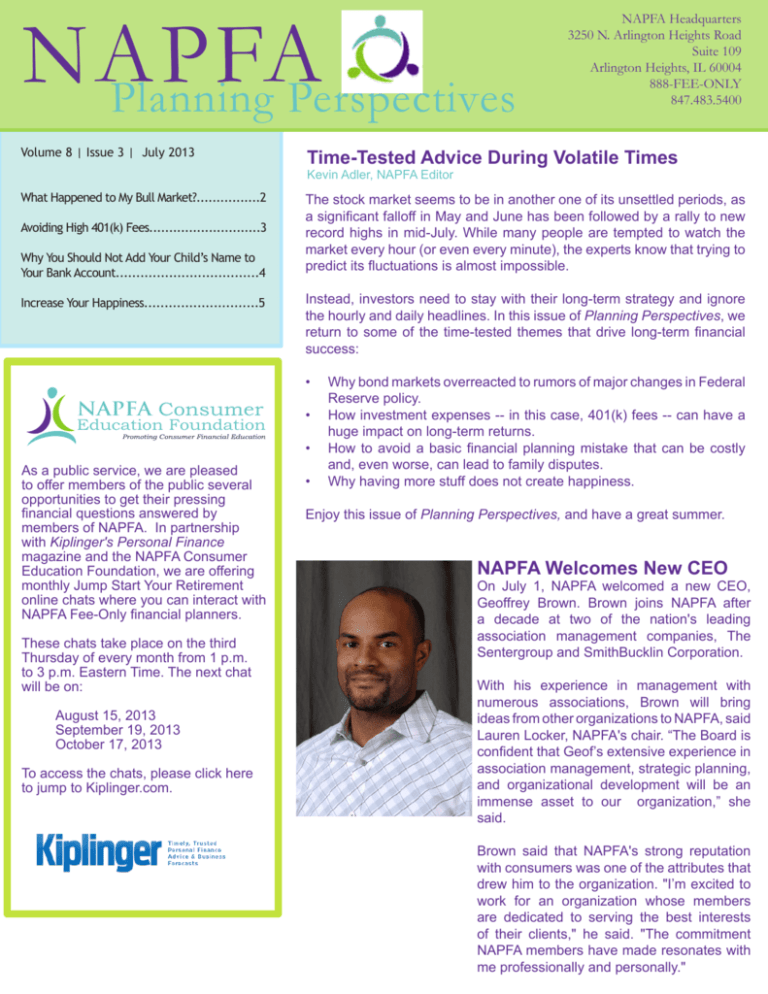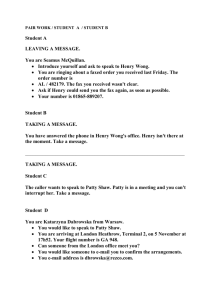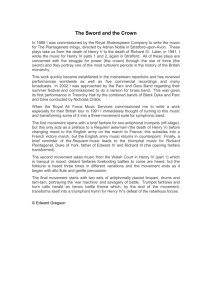
NAPFA
Planning Perspectives
Volume 8 | Issue 3 | July 2013
NAPFA Headquarters
3250 N. Arlington Heights Road
Suite 109
Arlington Heights, IL 60004
888-FEE-ONLY
847.483.5400
Time-Tested Advice During Volatile Times
Kevin Adler, NAPFA Editor
What Happened to My Bull Market?................2
Avoiding High 401(k) Fees............................3
Why You Should Not Add Your Child’s Name to
Your Bank Account...................................4
Increase Your Happiness............................5
The stock market seems to be in another one of its unsettled periods, as
a significant falloff in May and June has been followed by a rally to new
record highs in mid-July. While many people are tempted to watch the
market every hour (or even every minute), the experts know that trying to
predict its fluctuations is almost impossible.
Instead, investors need to stay with their long-term strategy and ignore
the hourly and daily headlines. In this issue of Planning Perspectives, we
return to some of the time-tested themes that drive long-term financial
success:
•
NAPFA Consumer
Education Foundation
Promoting Consumer Financial Education
As a public service, we are pleased
to offer members of the public several
opportunities to get their pressing
financial questions answered by
members of NAPFA. In partnership
with Kiplinger's Personal Finance
magazine and the NAPFA Consumer
Education Foundation, we are offering
monthly Jump Start Your Retirement
online chats where you can interact with
NAPFA Fee-Only financial planners.
These chats take place on the third
Thursday of every month from 1 p.m.
to 3 p.m. Eastern Time. The next chat
will be on:
August 15, 2013
September 19, 2013
October 17, 2013
To access the chats, please click here
to jump to Kiplinger.com.
•
•
•
Why bond markets overreacted to rumors of major changes in Federal
Reserve policy.
How investment expenses -- in this case, 401(k) fees -- can have a
huge impact on long-term returns.
How to avoid a basic financial planning mistake that can be costly
and, even worse, can lead to family disputes.
Why having more stuff does not create happiness.
Enjoy this issue of Planning Perspectives, and have a great summer.
NAPFA Welcomes New CEO
On July 1, NAPFA welcomed a new CEO,
Geoffrey Brown. Brown joins NAPFA after
a decade at two of the nation's leading
association management companies, The
Sentergroup and SmithBucklin Corporation.
With his experience in management with
numerous associations, Brown will bring
ideas from other organizations to NAPFA, said
Lauren Locker, NAPFA's chair. “The Board is
confident that Geof’s extensive experience in
association management, strategic planning,
and organizational development will be an
immense asset to our organization,” she
said.
Brown said that NAPFA's strong reputation
with consumers was one of the attributes that
drew him to the organization. "I’m excited to
work for an organization whose members
are dedicated to serving the best interests
of their clients," he said. "The commitment
NAPFA members have made resonates with
me professionally and personally."
Investing
What Happened to My Bull Market?
By Constanza Low and John Henry Low, CFP®
hen Ben Bernanke signaled in June
that the Fed might start reducing its
Quantitative Easing (QE) programs,
the bond markets went into a tail-spin. It was a
typical market over-reaction.
Oh the irony. On the one hand, Wall Street
couldn’t stop criticizing QE at every turn,
and yet, when Ben Bernanke announced a
thoughtful and measured reduction/exit strategy,
Wall Street panicked.
Why? Apparently, the Masters of the Universe
believed that the bull market of the past four
years was totally dependent on QE (it may have
helped, but it was hardly totally dependent on)
and that interest rates are going up (and no one
wants to hold bonds when interest rates are
rising). Add to that the leveraged traders/hedge
funds that didn’t want to be caught on the wrong
side of rising interest rates (especially at the
end of a quarter), so they sold deep and fast.
Investors who bought into riskier asset classes
for yield after they could no longer tolerate zero
percent bank interest also panicked and sold
(thus turning a temporary downturn into their
permanent loss).
www.knick.com
It's been a classic downward panic spiral. No
one really thought about the two important
things. First, the announcement is actually
GOOD news because it indicates that the Fed
thinks that the economy is strengthening and
doesn’t need ‘life support’ anymore. Besides,
the pullback of QE might not even happen this
year, as the tapering is conditional on economic
data. Tepid first-quarter growth of 1.8% makes it
unlikely the Fed will act right now, and if growth
slows further, we would expect an increase in
QE, not a withdrawal. This ‘conditionality’ of
the Chairman’s statements just started to sink
in during the very last days of June, and the
markets began to recover.
Second, this market rout is not about inflation.
Money manager Jeffrey Gundlach of Doubleline
says there are no signs of inflation in the
economy. None. Interest rates won’t be heading
up soon. This was a classic market overreaction and misreading of the situation.
Copyright 2013, Knickerbocker Advisors Inc. All
rights reserved.
What the Pundits Are Saying About the Economy and the Fed
“The Fed pullout is a sign the economy is getting stronger, which is nothing to fear –
and all of that is good for stocks.”
–Elizabeth MacDonald, Fox Business, who adds that stocks are still cheap at 15.5x earnings, lower than
the 17.3x earnings median since 1993 and lower than the average going back to 1954.
“Besides, the Fed can always start buying again if it is wrong…so what is there to worry about?”
-- Wharton economics guru Jeremy Siegel, who maintains his 16,000
to 17,000 target for the Dow Jones Industrial Index by year end.
“Really!?!! Really traders!?! Did you really believe that the Fed was never going to stop buying
bonds? Really?!? Do you think that the Fed was going to have an infinite accommodation, and
that rates were going to stay at zero forever? Is that what you expected from the Central bank.
C’mon, Really!?
--Barry Ritholz, financial author, analyst, and blogger.
Standard Bearer for the Profession - Champion for the Public - Beacon for Objective Financial Advisors
www.NAPFA.org
W
Knickerbocker Advisors Inc.
2
Investing
Avoiding High 401(k) Fees
By Mark Stinson, CFP®, CPA, MBA
Baltimore-Washington Financial Advisors
www.bwfa.com
Once again, the plan is not required to allow these
options.
Bo Lu, co-founder of FutureAdvisor, compared two
employees, one working for FedEx and one for
Best Buy, contributing to a 401(k). Both were the
same age (25), had the same salary ($55,000),
had the same wage growth, and contributed 10%
per year to their employer’s 401(k) plan. At the
end of 40 years, one employee’s 401(k) balance
was $87,000 higher. The difference was fees.
Besides high fees, there are other reasons to
consider in-service distributions:
• Fund performance. The funds offered in the
plan may be poor performers.
• Fund diversification. Some sectors of the
market might not be represented. For
example, few 401(k) plans offer a foreign bond
fund.
• Roth conversion. You might be in a tax
situation in which it is advantageous to convert
a portion of your 401(k) to a Roth IRA.
• Professional management. As Thomas
Friedman noted, investing in a 401(k) requires
you to know something about investing. With
your funds in an IRA, you can get outside
professional investment advice.
f you’re stuck in an expensive 401(k) plan, it
could be a $100,000 mistake.
While a significant fee difference between large
employers might be unusual, it is well known in
our industry that small-employer 401(k) fees are
much higher than large-company fees. The table
below, compiled from data in The 401(k) Averages
Book, compares the cost of large- and smallcompany 401(k) fees in 2012:
Avoid High 401(k) Fees with an In-Service
Distribution
What are your options if your employer has
negotiated a plan with high fees? One littleknown solution is an “in-service distribution.” Most
workers over 59½ (and some who are younger)
can roll over some, or all, of their 401(k) to an IRA
while they are still working and contributing to the
plan.
Current law allows employees to withdraw or roll
over (in-service distribution) without paying tax to
an IRA at 59½. However, the employer can decide
whether or not to allow in-service distribution.
Check with your 401(k) plan administrator and the
Summary Plan Document (SPD) for the rules in
your plan.
For those under 59½, the law permits in-service
distribution of money under any of these four
conditions: 1) it was rolled over into the 401(k)
from a previous employer; 2) employee (but not
employer) pre-tax contributions; 3) employee
after-tax contributions; or 4) account earnings.
Type of Plan
Small Plans
Large Plans
Plan Fees
1.46%
1.03%
However, there are reasons why leaving the funds
in your 401(k) might remain the best option, even
if your plan is fairly costly:
•
•
•
Early retirement. If you retire between age
55 and 59½, you can make penalty-free
withdrawals from your 401(k).
Working and over age 70. If you are working
and over age 70 ½, you are not required to
include the balance in your active employer
401(k) plan when calculating the Required
Minimum Distribution (RMD). You can keep
your money in your tax-deferred retirement
account longer, if you do not need the current
income.
Company stock. If you hold your employer’s
company stock in your 401(k), you might be
eligible for a tax break. (But the rules are
complicated.)
The bottom line is that you should watch the
fees on your 401(k) and talk with your plan
administrator and a financial advisor if you feel
that they are too high. You might have alternatives
that will save you money.
Investment Fees
1.37%
1.00%
www.NAPFA.org
I
Total Fees
2.83%
2.03%
Standard Bearer for the Profession - Champion for the Public - Beacon for Objective Financial Advisors
3
Taxes
Why You Should Not Add Your
Child's Name to Your Bank Account
By Eve L. Kaplan, CFP®
Kaplan Financial Advisors, LLC
lients sometimes ask me if they can add
their adult child’s name to their bank
account(s) so the child can tap funds as
needed or write checks on behalf of the client.
While adding a child’s name seems like a
harmless, familial gesture of love and trust,
the financial consequences can be extremely
negative to both parent and child.
Let's use a hypothetical example. June (age
65, widowed) has a $400,000 bank account in
her name. She wants to add her son, Henry
(age 35), to her bank account. June prefers
to bypass her daughter, Matilda, since Henry
is “more organized and better able to issue
checks” if June is sick or away in Florida
several months each winter.
•
Henry is separated from his wife, and they
likely will divorce. Henry’s wife will now
be entitled to a portion of this jointly held
account when their assets are divided.
(This is upsetting to June, too, because
she is on poor terms with Henry’s soon-tobe-ex-wife.)
•
If Henry accidentally rear-ends a
school bus and becomes involved in a
lawsuit, subsequent financial claims and
judgments will include June and Henry’s
account as part of Henry’s assets. The
entire $400,000 could be awarded to the
wronged party.
•
June has a will that clearly states she
wants to divide all her assets equally
between Henry and her daughter, Matilda.
If June dies unexpectedly after Henry’s
name is added to her bank account,
this ‘rights of survivorship’ joint account
bypasses her will entirely. In effect,
Henry will receive this extra $400,000
inheritance, and it’s unlikely this account
can be divided after the fact with Matilda.
If June has specific trust provisions in
her will, her joint account with Henry can
undermine the initial intention of her trust.
•
Adding Henry’s name to June’s account
can affect Medicaid benefits, including
entitlement to long-term care.
•
Henry's daughter is 17 and will be
attending college. Her application for
needs-based financial aid will be affected
by Henry's joint account with June.
Here are some unintended consequences
June could encounter:
•
•
•
Adding Henry’s name with rights of
survivorship means Henry is entitled to
all the same rights and responsibilities
as June. June never intended to make
this account a “gift” to Henry, but adding
Henry’s name means she has made a gift
to Henry. This may trigger gift taxes, or
at least require June to file forms with the
IRS to alert the federal agency about her
“gift” to Henry.
If Henry has some issues with a creditor
and a judgment is levied against him, the
entire $400,000 bank account could be
garnished -- even though June is co-owner
of this account and she was not involved
in any way.
Henry can withdraw the entire $400,000
at any time for his own use and is not
required to pay it back. In other words, the
entire account could evaporate, leaving
June empty-handed.
Adding a child’s name to your bank account
is an example of a number of harmless, wellintentioned gestures that trigger unexpectedly
negative consequences. It pays in spades to
consult with your financial planner and your
estate attorney before contemplating even the
simplest decisions.
Standard Bearer for the Profession - Champion for the Public - Beacon for Objective Financial Advisors
www.NAPFA.org
C
www.kaplanfinancialadvisors.com
4
LIFE
Increase Your Happiness: Shop, Don't Buy
By Mitch Conlon, CFP®
aniel Kahneman, the Nobel Prizewinning psychologist, famously argued
that upon reaching a certain income
point, money fails to buy additional happiness.
In fact, after covering the basics, plus a few
comfortable extras, we find ourselves on a
“hedonic treadmill” of working harder for more
stuff.
Other studies have refuted this notion,
suggesting richer countries are happier than
poorer countries.
Now comes a study published in The Journal
of Consumer Research, “When Wanting
is Better Than Having,” suggesting that
happiness is derived more from thinking about
a purchase than actually making the purchase
itself. The study’s author, Martha Richins,
concludes that “thinking about acquisition
provides momentary happiness boosts to
www.conlondart.com
materialistic people....but the positive emotions
associated with acquisition are short-lived.”
Perhaps we should all undertake a selfstudy to verify these findings. Start by logging
into Amazon.com. Then, shop around, put
a few items in your cart, and leave before
proceeding to check-out. Do you notice a
happiness boost? If so, spend that extra cash
on a fun travel experience, or -- crazy as this
sounds -- save it.
To learn more about the happiness study,
see The Atlantic’s recent story, "Why Wanting
Expensive Things Makes Us So Much Happier
than Buying Them." http://www.theatlantic.
com/business/archive/2013/06/why-wantingexpensive-things-makes-us-so-much-happierthan-buying-them/276717/
Mark Your Calendars:
Managing Your Financial Journey with CBS Analyst Jill Schlesinger
The NAPFA Consumer Education Foundation is hosting a
special consumer education seminar at the Marriott
Downtown Hotel in Philadelphia on October 8 with CBS
News business analyst Jill Schlesinger. She will present a one-hour session on financial
independence during some of life’s key transitions, such as blending two lives, retirement,
and divorce. After her presentation, Schlesinger and a panel of NAPFA-Registered Financial
Advisors will respond to questions from audience members.
"Jill Schlesinger has been a long-time advocate for consumers and a trusted source of
financial information," said NCEF President Jamie Milne. "We are delighted that she will help
the NAPFA Consumer Education Foundation (NCEF) reach out to the public about how to
build an actionable and strong financial plan."
This event will mark the official launch of the Managing Life’s Financial Journey Project,
the newest education program from the NCEF. The Journey Project is an online resource of
objective information about a wide range of consumer finance issues, organized around key
transitional moments and themes. For more information about the seminar and NCEF’s
activities, go to www.napfafoundation.org.
Standard Bearer for the Profession - Champion for the Public - Beacon for Objective Financial Advisors
www.NAPFA.org
D
Conlon Dart Wealth Management
5









